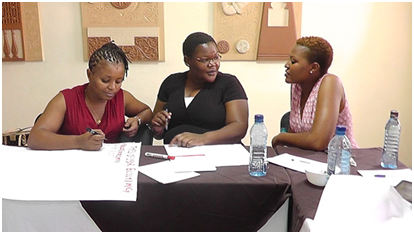A study found at least seven out of 10 women journalists in Kenya have been harassed online in the course of their work, a fact that organizations in Kenya are addressing through trainings and more.
The research, conducted by the Association of Media Women in Kenya (AMWIK) and Article 19 Eastern Africa, reveals that common attacks targeting women journalists were cyber stalking, sexual harassment, surveillance and unauthorized use and manipulation of personal information, including images and videos.
Researchers collected data through questionnaires, phone interviews, online shadowing and written publications. Sixty-one journalists sampled from Nakuru, Nairobi, Kisumu and Mombasa took part in the study.
Below are some of the findings:
- Seventy-five percent of the respondents have experienced online harassment in the course of their work.
- Most journalists rely on Facebook (53.7 percent), WhatsApp (86.4 percent), email (61.5 percent) and mobile voice (96.2 percent) for their day-to-day work.
- Thirty-six percent of the respondents preferred to ignore the attacks and took no action against the posts or the perpetrators.
- Digital harassment leads women to withdraw from using the internet, and in many cases, women have stopped working for some time. It also changes women’s patterns of online interaction , as they sometimes avoid engaging in online discussions for fear of being targeted.
- Hacking, stalking and threatening are the most common forms of digital harassment against women.
- Fifty-four percent of the respondents rate their knowledge of digital security tools and practices as “good,” and 29 percent as rate it as “workable.” Most of the tools that women use are built into their devices, including passwords and screen locks.
According to the report, women journalists "fall victim because of the nature of topics they cover,such as politics, sports, lifestyle and sexuality."
Researchers sought to raise awareness of online violence against women journalists, the evolving nature of digital threats and interventions needed to address the attacks.
The study also surveyed types and patterns of online harassment against women journalists, plus ways of improving reporting mechanisms of the attacks and related policies
Researchers included with the findings recommendations for addressing online harassment based on their conversations with women journalists. The researchers suggest media houses establish counseling programs to offer psychosocial support to traumatized journalists. In addition, the study recommends developing anti-sexual violence policies to provide gender-responsive mechanisms for tackling harassment.
AMWIK is also enabling women journalists to counter online harassment through digital security trainings.

Marceline Nyambala, AMWIK's executive director, emphasized the necessity of continuously educating women on available digital security tools , especially considering the high probability of attacks targeting them.
"Following the training,journalists from the coast (Mombasa) and Kisumu (western Kenya) [gave] positive feedback that they have succeeded in minimizing the attacks by employing techniques [they had been] exposed to during the trainings," said Nyambala.
She also said a multi-pronged approach involving media houses and law enforcement officers would be crucial to tackling gendered online violence in Kenya, and subsequently enhancing women journalists’ productivity.
In the report, researchers raised concern that "name calling and insulting comments have been accepted as the norm, so that women who report these cases are
tagged as ‘petty,’ yet they negatively affect women’s productivity at their workplaces and how they use the internet."
Winnie Miseda, an online editor for Media 16 and a beneficiary of AMWIK's anti-online harassment training, said that she has become more guarded with her personal information and how she interacts with strangers.
"I am more cautious of who I respond to whenever I receive messages on WhatsApp, lest I expose myself to attacks," she said. "I am [also] no longer putting as much information about myself on social media.".
Jael Lieta, a reporter with NamLolwe FM based in Kisumu and another participant in an AMWIK training, said her online etiquette has changed since the course. She no longer engages with potential online attackers.
"Engaging online attackers increases one's vulnerability and therefore, it is important to ignore them," said Lieta.
Other ways of protecting oneself online, according to Nyambala, include:
- Using certified software or anti-virus and keep them up-to-date. This minimizes hacking or surveillance.
- Setting up complex passwords to prevent strangers from accessing information on mobile devices that they can use as leverage for attack.
- Avoiding posting subjective information or comments on published stories.
Main image CC-licensed by Flickr via Women of Color in Tech.

